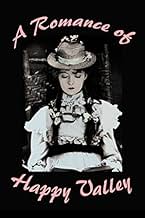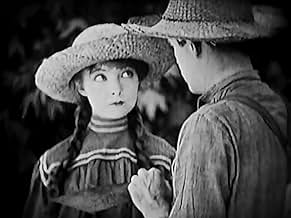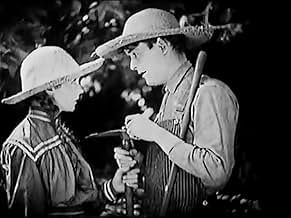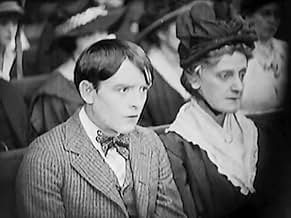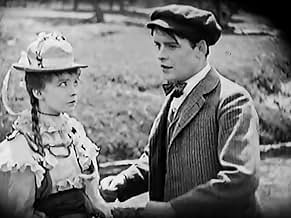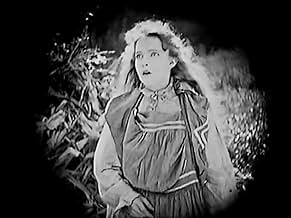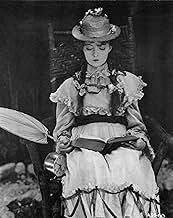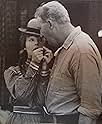John Logan leaves his parents and sweetheart in bucolic Happy Valley to make his fortune in the city. Those he left behind become miserable and beleaguered in his absence, but after several ... Read allJohn Logan leaves his parents and sweetheart in bucolic Happy Valley to make his fortune in the city. Those he left behind become miserable and beleaguered in his absence, but after several years he returns, a wealthy man.John Logan leaves his parents and sweetheart in bucolic Happy Valley to make his fortune in the city. Those he left behind become miserable and beleaguered in his absence, but after several years he returns, a wealthy man.
Carol Dempster
- Girl John Logan meets in New York
- (uncredited)
- Director
- Writers
- All cast & crew
- Production, box office & more at IMDbPro
Featured reviews
For many years, this film was among a number of D. W. Griffith films from the 1918-1919 season which were considered irretrievably lost. In the 1970s it was discovered in the Gosmofilmfund in Russia, and through some complicated negotiations was acquired by the Museum of Modern Art in time for the Griffth centenary in 1975. Prints in English have the subtitles replaced, as the Russian print was subtitled in Ukrainian. The story is a simple one and personally close to Griffith's heart - a Kentucky lad, played by Robert Harron, is an inventor and hears of opportunity in New York. Although the townsfolk, his mother and father, and his sweetheart, played by Lillian Gish, all try to restrain him from leaving Happy Valley, he does so. In New York, the boy works tirelessly on his invention for eight years and resists a number of temptations. Little does he know that back home, his sweetheart is struggling with similar issues, and when the foreclosure notice comes on the family home, his father, whose opposition to the boy's departure to New York was particularly noisome, experiences a major crisis of temptation himself. The title card identifies this as a "Griffith Short Story" vehicle, and it plays like one of Griffith's Biograph shorts, only much longer. It is not one of his most technically accomplished films, and there are some uncomfortable racial characterizations, though nothing of the kind witnessed in "The Birth of a Nation." But it is a chamber movie, sort of a sketch for "True Heart Susie" and "Way Down East," rural stories told on a more ambitious scale. It contains much of Griffith's idealized vision of his childhood Kentucky, and the desperation of the father may have drawn to some extent on Griffth's own father's struggles late in life. Overall, it is a sweet, unpretentious little film which mean, and does, no harm to anyone. Not a major masterpiece, but an attractive film in a genre that was a Griffith specialty, local in orientation but universal in theme.
Back in the early 20th century, D.W. Griffith was an innovative filmmaker. He managed to tell wonderful stories and was wildly popular through the 1910s. However, as the years passed, Griffith went from being an innovator to being very old fashioned and stodgy. It wasn't that his films had changed so much as times had changed and he hadn't kept up with them. This is strongly evident with his "A Romance of Happy Valley"—a film which worked in 1919 when it debuted but which would just seem hokey into the 1920s. This is because the film is extremely moralistic and the subtitles often come off as preachy homilies than anything else.
The story is one close to Griffith's heart. After all, like the characters in the story, he grew up in rural Kentucky and he idealized its simple way of life. Oddly, however, the film decries the evils of moving to the big city—something Griffith himself did when he packed up and moved to Los Angeles. While the city was hardly a metropolis at the time, compared to his native Kentucky, it was practically sin city! The story is about a country boy named Johnny. After hearing a New Yorker talk about how wonderful the big city is, Johnny is determined to go there and make his fortune. The problems are that Jennie (Lillian Gish) is in love with him and his parents have worked hard on the farm in order to pass it down to him. Regardless, he eventually does go to New York and soon learns about the drudgeries of city life. And, while he promised to return in one year, one year soon stretches to eight! What's to become of Jennie and Johnny's farm? If you could re-write the heavy-handed intertitle cards (which sound more like the teachings of Norman Vincent Peale than those of a filmmaker), didn't use white folks painted black* as well as NOT made all the references to Judas Iscariot for one of the characters, the film would have worked a lot better. After all, the ending is very creative and the cinematography was lovely. Worth seeing but is extremely old fashioned and is not among Griffith's better work. And, if you've seen other films like Griffith's "Home, Sweet Home" you'll see that the themes in "A Romance of Happy Valley" are often repeated in his work.
*After watching this film and other Griffith films (especially "Birth of a Nation"), I can only conclude that Griffith must have really hated black people. Again and again, instead of hiring black actors, he usually just had white guys paint themselves with burnt cork to play black parts. An enlightened guy he wasn't—and may help explain why such an important early filmmaker is all but forgotten today.
The story is one close to Griffith's heart. After all, like the characters in the story, he grew up in rural Kentucky and he idealized its simple way of life. Oddly, however, the film decries the evils of moving to the big city—something Griffith himself did when he packed up and moved to Los Angeles. While the city was hardly a metropolis at the time, compared to his native Kentucky, it was practically sin city! The story is about a country boy named Johnny. After hearing a New Yorker talk about how wonderful the big city is, Johnny is determined to go there and make his fortune. The problems are that Jennie (Lillian Gish) is in love with him and his parents have worked hard on the farm in order to pass it down to him. Regardless, he eventually does go to New York and soon learns about the drudgeries of city life. And, while he promised to return in one year, one year soon stretches to eight! What's to become of Jennie and Johnny's farm? If you could re-write the heavy-handed intertitle cards (which sound more like the teachings of Norman Vincent Peale than those of a filmmaker), didn't use white folks painted black* as well as NOT made all the references to Judas Iscariot for one of the characters, the film would have worked a lot better. After all, the ending is very creative and the cinematography was lovely. Worth seeing but is extremely old fashioned and is not among Griffith's better work. And, if you've seen other films like Griffith's "Home, Sweet Home" you'll see that the themes in "A Romance of Happy Valley" are often repeated in his work.
*After watching this film and other Griffith films (especially "Birth of a Nation"), I can only conclude that Griffith must have really hated black people. Again and again, instead of hiring black actors, he usually just had white guys paint themselves with burnt cork to play black parts. An enlightened guy he wasn't—and may help explain why such an important early filmmaker is all but forgotten today.
Watching silent films has been of great fascination for quite some time now and there are some truly fine ones, some revolutionary technically or in terms of subject. Not all are great and a few controversial, but there are many great or iconic ones. Among the best of them is the best of DW Griffith, and the more that has been seen of Griffith's work (short and feature films) the more interesting he has come to me. We also have Griffith regular Lillian Gish, among the greatest silent film actresses, in the lead role.
'A Romance of Happy Valley' is not one of Griffith's best, it is not quite 'Intolerance', 'True Heart Susie', 'Orphans of the Storm', 'Way Down East' and 'Broken Blossoms' level, all very good to brilliant. Much prefer it though over 'Birth of a Nation', appreciate its importance but the second half spoilt it significantly for me, and especially 'Abraham Lincoln' (with him being one of not many silent film directors to clearly not transition well into sound). 'A Romance of Happy Valley' is somewhere in the middle as far as his work goes and is a very good representation of Gish.
There is actually not a huge amount wrong with 'A Romance of Happy Valley' in my view. The story is very slight, making for some ploddy moments in the less eventful stretches, and quite old-fashioned.
Do agree too that the ending came over as far-fetched and quite weird even, actually found it rather out of place and shoehorned in and it is a rare case of me saying that an abrupt and pat ending (usually dislike this kind of ending) would have been preferable.
Gish however is wonderful as ever, she is incredibly endearing, radiates charm and has amusing comic timing. She also has the right amount of pathos, something that she conveyed better than any other actress at that time. Robert Harron gives another sensitive and nuanced performance, succeeding in making his on paper slightly bland character interesting. George Fawcett chills the bone and it is scary at how much his character gets away with. Griffith's direction has been more creative in his other films, but it is understated and shows someone that clearly knew what he was doing.
Have no qualms with the production values, the scenery is quaint and the photography has beauty and intimacy, even if this aspect is more distinct in other Griffith films. The story is not perfect, but it has a very big heart, is rich in charm and there is poignant emotion. The characters are not meaty but they're worth engaging with.
In conclusion, good if not great. 7/10
'A Romance of Happy Valley' is not one of Griffith's best, it is not quite 'Intolerance', 'True Heart Susie', 'Orphans of the Storm', 'Way Down East' and 'Broken Blossoms' level, all very good to brilliant. Much prefer it though over 'Birth of a Nation', appreciate its importance but the second half spoilt it significantly for me, and especially 'Abraham Lincoln' (with him being one of not many silent film directors to clearly not transition well into sound). 'A Romance of Happy Valley' is somewhere in the middle as far as his work goes and is a very good representation of Gish.
There is actually not a huge amount wrong with 'A Romance of Happy Valley' in my view. The story is very slight, making for some ploddy moments in the less eventful stretches, and quite old-fashioned.
Do agree too that the ending came over as far-fetched and quite weird even, actually found it rather out of place and shoehorned in and it is a rare case of me saying that an abrupt and pat ending (usually dislike this kind of ending) would have been preferable.
Gish however is wonderful as ever, she is incredibly endearing, radiates charm and has amusing comic timing. She also has the right amount of pathos, something that she conveyed better than any other actress at that time. Robert Harron gives another sensitive and nuanced performance, succeeding in making his on paper slightly bland character interesting. George Fawcett chills the bone and it is scary at how much his character gets away with. Griffith's direction has been more creative in his other films, but it is understated and shows someone that clearly knew what he was doing.
Have no qualms with the production values, the scenery is quaint and the photography has beauty and intimacy, even if this aspect is more distinct in other Griffith films. The story is not perfect, but it has a very big heart, is rich in charm and there is poignant emotion. The characters are not meaty but they're worth engaging with.
In conclusion, good if not great. 7/10
Romance of Happy Valley, A (1918)
** 1/2 (out of 4)
D.W. Griffith film was one of four he rushed at First National. A poor boy (Robert Harron) from Kentucky goes to NYC to make a fortune while his love (Lillian Gish) waits back at home. In a lot of ways this was a semi-bio pick about Griffith's own life as he too was a poor boy from Kentucky who went to the big city to make it rich. Like the character in the movie, Griffith at the time was breaking up with Gish in favor of Carol Dempster who has a small part in this film playing a NYC girl who tries to steal the Kentucky boy. On the whole, this film is rushed together and it really doesn't work in the end even though there's a lot to admire here. The performances by Harron and Gish are very good and the cinematography by G.W. Bitzer is also good. The story drags at even 70-minutes with a far fetched ending that borrows from Griffith's earlier film The Son's Return.
** 1/2 (out of 4)
D.W. Griffith film was one of four he rushed at First National. A poor boy (Robert Harron) from Kentucky goes to NYC to make a fortune while his love (Lillian Gish) waits back at home. In a lot of ways this was a semi-bio pick about Griffith's own life as he too was a poor boy from Kentucky who went to the big city to make it rich. Like the character in the movie, Griffith at the time was breaking up with Gish in favor of Carol Dempster who has a small part in this film playing a NYC girl who tries to steal the Kentucky boy. On the whole, this film is rushed together and it really doesn't work in the end even though there's a lot to admire here. The performances by Harron and Gish are very good and the cinematography by G.W. Bitzer is also good. The story drags at even 70-minutes with a far fetched ending that borrows from Griffith's earlier film The Son's Return.
Out of all the autobiographys written on Griffith and all of his movies, none come close to tuly identifying the man who was known as the Father of Filmmaking. A Romance of Happy Valley is not only Griffith's vision of what Kentucky was in his eyes, but himself. From Griffith's upbrining as a poor, farmer, his ideal as a businessman and most importanly, his relationship with women are all on display in this movie. Robert Harron portray John Logan, who is without a doubt a young D. W. Griffith. Throughout their careers, Harron anf Griffith were close. The speculation of them being gay has been debated for the last 100 years. Looking into their relationsip as Actor and Director, and what happened to both men off screen has been the subject to much speculation. It is hard to ignore how Griffith showcases Lillian Gish in his portrayal of first love and how a woman is suppose to be treated alongside business and success. A Romance of Happy Vallet is more of a bio-pic of Griffith than a love story.
Did you know
- TriviaBelieved lost for almost 50 years, a print was discovered in 1965 in the State Film Archives of the Soviet Union, which donated it to the Museum of Modern Art.
Details
- Release date
- Country of origin
- Languages
- Also known as
- The Romance of Happy Valley
- Production company
- See more company credits at IMDbPro
- Runtime
- 1h 16m(76 min)
- Color
- Sound mix
- Aspect ratio
- 1.33 : 1
Contribute to this page
Suggest an edit or add missing content

